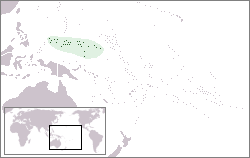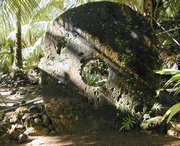Federated States of Micronesia
|
|
The Federated States of Micronesia are a constitutional government in free association with the United States, located in the Pacific Ocean, northeast of Papua New Guinea.
The Federated States of Micronesia were formerly part of the Trust Territory of the Pacific Islands, a United Nations Trust Territory under US administration. In 1979 they adopted a constitution, and in 1986 independence was attained under a Compact of Free Association with the United States. Present concerns include large-scale unemployment, overfishing, and overdependence on U.S. aid.
The Federated States of Micronesia are located in the region known as Micronesia, which consists of hundreds of small islands divided in seven territories. The name Micronesia often refers to the Federated States, although it is the official name of the whole region.
| |||||
| National motto: Peace Unity Liberty | |||||

| |||||
| Official language | English | ||||
| Capital | Palikir | ||||
| President | Joseph J. Urusemal | ||||
| Area - Total - % water | Ranked 173rd 702km² Negligible | ||||
| Population - Total (2000) - Density | Ranked 177th 135,869 194/km² | ||||
| GDP (PPP) - Total (1997) - GDP/head | Ranked 173rd 240 millions $ ¹ 2,000 $ | ||||
| Currency | United States dollar | ||||
| Time zone | UTC +10 (no DST) | ||||
| Independence - Declared - Recognised | From the U.S. (1986) (1986) | ||||
| National anthem | Patriots of Micronesia | ||||
| Internet TLD | .fm | ||||
| Calling Code | +691 | ||||
| 1 GDP is supplemented by aid, averaging perhaps $100 million annually | |||||
| Contents |
History
Main article: History of the Federated States of Micronesia
The ancestors of the Micronesians settled over 4,000 years ago. A decentralized chieftain-based system eventually evolved into a more centralized economic and religious empire centered on Yap.
Nan Madol, consisting of a series of small artificial islands linked by a network of canals, is often called the Venice of the Pacific. It is located near the island of Pohnpei and used to be the ceremonial and political seat of the Saudeleur dynasty that united Pohnpei's estimated 25,000 people from about AD 500 until 1500, when the centralized system collapsed.
European explorers - first the Portuguese in search of the Spice Islands (Indonesia) and then the Spanish - reached the Carolines in the 16th century, with the Spanish establishing sovereignty. It passed from German control (1899), via Japanese (1914) to the United States under United Nations auspices in 1947 as part of the Trust Territory of the Pacific Islands.
During World War II, a significant portion of the Japanese fleet was based in Truk Lagoon. In February 1944, Operation Hailstone, one of the most important naval battles of the war, took place at Truk, in which many Japanese support vessels and aircraft were destroyed.
On May 10, 1979, four of the Trust Territory districts ratified a new constitution to become the Federated States of Micronesia. The FSM signed a Compact of Free Association with the United States of America, which entered into force on November 3, 1986, marking Micronesia's emergence from trusteeship to independence.
Politics
Main article: Politics of the Federated States of Micronesia
The Federated States of Micronesia are governed by the 1979 constitution, which guarantees fundamental human rights and establishes a separation of governmental powers. The unicameral Congress has 14 members elected by popular vote. Four senators - one from each state - serve 4-year terms; the remaining 10 senators represent single-member districts based on population, and serve 2-year terms. The President and vice president are elected by Congress from among the four state-based senators to serve 4-year terms in the executive branch. Their congressional seats are then filled by special elections. The president and vice president are supported by an appointed cabinet. There are no formal political parties.
Geography
Main article: Geography of the Federated States of Micronesia
CIA-FSM.jpg
It consists of 607 islands extending 1,800 miles across the archipelago of the Caroline Islands east of the Philippines. The four constituent island groups are Yap, Chuuk (called Truk until January 1990), Pohnpei (called Ponape until November 1984), and Kosrae. These four states are each represented by a white star on the national flag. The capital is Palikir, on Pohnpei.
Economy
Main article: Economy of the Federated States of Micronesia
Economic activity of the Federated States of Micronesia consists primarily of subsistence farming and fishing. The islands have few mineral deposits worth exploiting, except for high-grade phosphate. The potential for a tourist industry exists, but the remoteness of the location and a lack of adequate facilities hinder development. Financial assistance from the US is the primary source of revenue, with the US pledged to spend $1.3 billion in the islands in 1986-2001. Geographical isolation and a poorly developed infrastructure are major impediments to long-term growth.
Demographics
Main article: Demographics of the Federated States of Micronesia
The indigenous population of the Federated States of Micronesia, which is predominantly Micronesian, consists of various ethnolinguistic groups. English has become the common language. Population growth remains high at more than 3%, ameliorated somewhat by net emigration.
Pohnpei is notable for the prevalence of the extreme form of color blindness known as maskun.
Culture
Main article: Culture of the Federated States of Micronesia.
Each of the four States has its own culture and traditions, but there are also common cultural and economic bonds that are centuries old. For example, cultural similarities like the importance of the traditional extended family and clan systems can be found on all the islands.
The island of Yap is notable for its stone money (see photograph at right), large disks usually of calcite, up to 4 m (12 ft) in diameter, with a hole in the middle. The islanders know who owns which piece, but do not necessarily move them when ownership changes. There are five major types: Mmbul, Gaw, Ray, Yar, and Reng, this last being only 0.3 m (1 ft) in diameter. Their value is based on both size and history, many of them having been brought from other islands, as far as New Guinea, but most coming in ancient times from Palau. Approximately 6,500 of them are scattered around the island.
Miscellaneous topics
- Communications in the Federated States of Micronesia
- Transportation in the Federated States of Micronesia
- Military of the Federated States of Micronesia
- Foreign relations of the Federated States of Micronesia
External links
- myMicronesia.com (http://www.mymicronesia.com)
- Online resource center about the islands of Micronesia. Provides free listings and links to all Micronesian businesses, as well as civic, cultural, health and educational organizations.
- Map of Micronesia (http://www.mapsouthpacific.com/micronesia/index.html)
- Moon Handbooks Micronesia (http://www.southpacific.org/micro.html)
- Nan Madol islet complex (http://www.uoregon.edu/~wsayres/NanMadol.html)
- Provides computer based reconstruction of the main islets and features.
- Jane's Federated States of Micronesia Home Page (http://www.janeresture.com/fedmic/index.htm)
- Pacific Islands Legal Information Institute - Federated States of Micronesia (http://www.paclii.org/databases.html#FM)
Official sites
- Government of the Federated States of Micronesia (http://www.fsmgov.org)
References
- US-CIA. CIA - The World Factbook: Federated States of Micronesia (http://www.cia.gov/cia/publications/factbook/geos/fm.html). The World Factbook. United States of America: Central Intelligence Agency. 2003.
Template:Pacific Islandsca:Estats Federats de Micronèsia da:Mikronesien de:Föderierte Staaten von Mikronesien et:Mikroneesia Liiduriigid es:Estados Federados de Micronesia eo:Federacio de Mikronezio fr:États fédérés de Micronésie he:מיקרונזיה hu:Mikronézia (ország) id:Mikronesia it:Stati Federati di Micronesia ja:ミクロネシア連邦 ko:미크로네시아 연방 nds:Mikronesien nl:Micronesia pl:Federacja Mikronezji pt:Estados Federados da Micronésia ru:Микронезия sl:Mikronezija fi:Mikronesian liittovaltio sv:Mikronesiens federerade stater th:ประเทศไมโครนีเซีย zh:密克罗尼西亚联邦 zh-min-nan:Micronesia Liân-pang-kok



